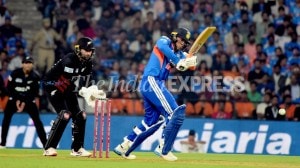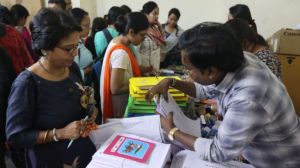Coomar8217;s nine lives
You are a lucky guy,'' Sudhir told me when I said I was going to Kargil after the outbreak of the conflict. There was genuine envy in h...

8220;You are a lucky guy,8221; Sudhir told me when I said I was going to Kargil after the outbreak of the conflict. There was genuine envy in his voice. 8220;Take it easy, sir, you8217;ve done nine years in counter-insurgency operations in Kashmir. Plus Sri Lanka. Now enjoy the peace station,8221; I replied.
But Major Sudhir Kumar Walia, a para commando and twice Sena Medal winner for gallantry, was not one to take it easy. Though he had a coveted, cushy job in South Block as ADC to General Ved Prakash Malik, Chief of Army Staff, an air-conditioned room, personal staff and a lovely cottage in Delhi8217;s Rajaji Marg were not for him.
Coomar, as Major Sudhir preferred to be called after his days in the US, had been made an honourary colonel of the Alabama Army after he topped a course there. And this was not the first time he had topped. The unassuming lad from Panuri village in Palampur had many firsts to his credit. Son of a junior commissioned officer JCO, he was the first boy from this village to become anofficer.
This his mother ensured. She did not let him become a wrestler like his brother or other friends and relatives. She pushed him into joining Sainik School, Sujanpur Tihra, where he discovered he had a razor sharp mind. Being a hill billy he had no problems in physical training either. He joined the National Defence Academy NDA and Indian Military Academy IMA and after four years of rigorous training he was commissioned in the Jat regiment.
The 21-year-old lad found himself in Sri Lanka soon after, fighting LTTE guerrillas. 8220;He became an expert in guerrilla warfare. At 23, he was a war veteran,8221; his friends say. Sudhir, however, never spoke about it. He could not take it when the Jat regiment came back to a peace station. A nine-to-five desk job was not for him. He volunteered to join the elite Special Forces Regiment and after another three months of specialised training became a para commando.
8220;I just love to soar and plummet in the sky,8221; Sudhir often said. He used to take risks. If theparachute had to be opened at a particular altitude, Sudhir would continue free falling further and in the nick of time pull the string. He subsequently specialised in combat free fall. 8220;Sir, a cat has nine lives. You8217;ve lived yours. Now relax,8221; the warning by caring friends was lost on Sudhir 8220;the lion-hearted8221; Coomar.
Being a linguist and an expert wireless operator, Sudhir would sit on a wireless set for hours, flipping the dial, trying to break into other frequencies. He would find out more about terrorist movements, hideouts and their language. And then he would lay a trap.
8220;He led several operations where he caught terrorists, destroyed camps and came back without a single casualty,8221; recalls a friend. And there were times when he went climbing, guns blazing, not sparing a single fleeing terrorist. But he hardly ever spoke of his gallantry. For his bravery he was awarded the Sena Medal twice in nine years. He was also awarded a wound medal for being severely wounded in combat with the enemy.8220;The army has been kind to me,8221; was all he would say.
After those long years in combat, he planned to do a course in Staff College Wellington when the Kargil conflict broke. His blood boiled when he heard stories of fellow soldiers being brutally killed during initial operations to recover the peaks.
Being on the personal staff of General Malik, he pestered the chief to let him go. Again and again. Sudhir8217;s heart was on the Drass heights. The chief knew and finally relented. Hours after reaching Drass, Sudhir led an operation killing 25 intruders and recovering the crucial Zulu 1 peak. Once action was over in the heights, he moved down to Kupwara with his commando outfit tackling resurgent insurgency.
In one such operation early Sunday morning, Sudhir entered a terrorist camp. He killed nine of them but he had lived his nine lives.
- 01
- 02
- 03
- 04
- 05































